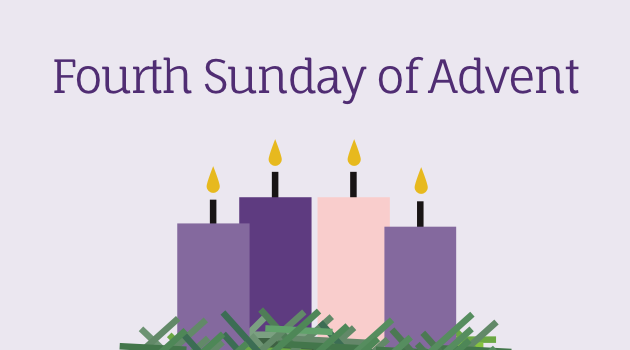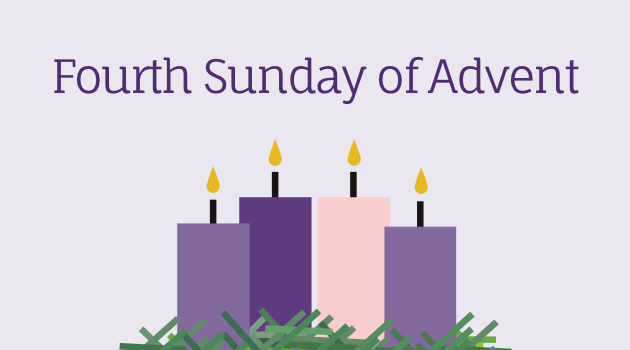
We began this Advent series of reflections with the question: what are you waiting for? With the busy-ness of Commercial Christmas constantly demanding our attention, it is easy to lose sight of the watchfulness and preparation the Church asks of us this Advent season. Let us now continue with our reflection series on this Fourth Sunday of Advent….
This Fourth week of Advent will only last one day, as Christmas comes to us the following day. Even so, it is important to reflect on this final Sunday before we embrace the celebration of the Christmas season.
Anticipation
We have been anticipating the coming of Christ through the Sunday readings since the beginning of Advent. As I reflect on the Gospel reading for today, the sense of anticipation is intense, the sequence of events almost seems to unfold in slow motion.
First, an angel, Gabriel, is headed for Mary in Nazareth, with staggering news. Upon learning of the approaching angel, we are told twice in v. 27 that Mary is a virgin, a pious and observant Jew. Yet Nazareth was a city of little consequence in Judea and an unlikely place for the appearance of an angel.
Second, as the angel approaches Nazareth, what is Mary doing? Presumably she’s at home attending to everyday domestic chores and tasks. She may be making preparations for her marriage to Joseph or attending to other family matters.
Heavy News
When Gabriel confronts Mary, with “Hail, favored one!” one gets the sense of Mary’s total surprise. She is understandably startled and confused, as an angel of God has just manifested himself in the midst of her dinner preparations or wedding planning or house cleaning. Mary is “greatly troubled” by the words of her new divine visitor and “pondered” what these words might mean. The angel goes on:
Do not be afraid, Mary, for you have found favor with God. Behold, you will conceive in your womb and bear a son, and you shall name him Jesus. He will be great and will be called Son of the Most High, and the Lord God will give him the throne of David his father, and he will rule over the house of Jacob forever, and of his kingdom will be no end.
Wow, was this a joke? How could any of this be true? The Son of God? A ruler of the house of Jacob? Maybe she had already heard of her cousin Elizabeth’s recent miraculous conception. One can only imagine what must be rushing through Mary’s mind as this flood of new information about her future washes over her. Mary, understandably replies with incredulity and with the most practical of questions: “How can this be, since I have no relations with a man?”
The angel goes on to explain:
The holy Spirit will come upon you, and the power of the Most High will overshadow you. Therefore the child to be born will be called holy, the Son of God. And behold, Elizabeth, your relative, as also conceived a song in her old age…for nothing will be impossible for God.
The sense of anticipation continues through the delivery of this “heavy news.” But what will be Mary’s response to this astonishing proclamation? She must have realized the position this would put her and Joseph in with their engagement. People in the community would start to talk of Mary’s “indiscretion.” Her status as a pious Jewish woman would be compromised. Who would believe such an incredible story?
The Ultimate “Yes”
Yet in the the face of this startling news and the seismic shift in her future plans, Mary famously responds:
Behold, I am the handmaid of the Lord. May it be done to me according to your word.
Mary gives her consent to the angel and to God to become the mother of the Son of God. As with the birth of any child, it changes the parents’ lives forever. But this birth is accompanied by a divine conception, both for her and her cousin, and a divine mandate for Israel. What a perfectly serene response!
Mary is held up throughout the Scriptures as the model disciple, responding to God and His messengers with perfect obedience and submission. This was undoubtedly not easy for Mary to accept, but she does accept and embraces this new divine mission for her life.
As we await the coming of Jesus, how can we say a more perfect “yes” to God?
- What does that need to look like in our final days of Advent?
- Can we say “yes” to God in how we prioritize our time for prayer each day?
- Can we say “yes” to God more often in the Sacrament of Reconciliation?
- What relationships in our life are in greater need of a “yes” to God?
Gospel Reading for the Fourth Sunday of Advent
The angel Gabriel was sent from God to a town of
Galilee called Nazareth, to a virgin betrothed to a
man named Joseph, of the house of David, and the
virgin’s name was Mary. And coming to her, he
said, “Hail, full of grace! The Lord is with you.”
But she was greatly troubled at what was said and
pondered what sort of greeting this might be. Then
the angel said to her, “Do not be afraid, Mary, for
you have found favor with God.
“Behold, you will conceive in your womb and bear
a son, and you shall name him Jesus. He will be
great and will be called Son of the Most High, and
the Lord God will give him the throne of David his
father, and he will rule over the house of Jacob forever,
and of his kingdom there will be no end.” But
Mary said to the angel, “How can this be, since I
have no relations with a man?”
And the angel said to her in reply, “The Holy Spirit
will come upon you, and the power of the Most
High will overshadow you. Therefore the child to
be born will be called holy, the Son of God. And
behold, Elizabeth, your relative, has also conceived
a son in her old age, and this is the sixth month for
her who was called barren; for nothing will be impossible
for God.” Mary said, “Behold, I am the
handmaid of the Lord. May it be done to me according
to your word.” Then the angel departed from
her.





